- Home
- Roald Dahl
Trickery Page 3
Trickery Read online
Page 3
‘How many keepers are there?’ I asked.
‘Three.’
Claud threw away a half-finished cigarette. A minute later he lit another.
‘I don’t usually approve of new methods,’ he said. ‘Not on this sort of a job.’
‘Of course.’
‘But by God, Gordon, I think we’re on to a hot one this time.’
‘You do?’
‘There’s no question about it.’
‘I hope you’re right.’
‘It’ll be a milestone in the history of poaching,’ he said. ‘But don’t you go telling a single soul how we’ve done it, you understand. Because if this ever leaked out we’d have every bloody fool in the district doing the same thing and there wouldn’t be a pheasant left.’
‘I won’t say a word.’
‘You ought to be very proud of yourself,’ he went on. ‘There’s been men with brains studying this problem for hundreds of years and not one of them’s ever come up with anything even a quarter as artful as you have. Why didn’t you tell me about it before?’
‘You never invited my opinion,’ I said.
And that was the truth. In fact, up until the day before, Claud had never even offered to discuss with me the sacred subject of poaching. Often enough, on a summer’s evening when work was finished, I had seen him with cap on head sliding quietly out of his caravan and disappearing up the road towards the woods; and sometimes, watching him through the windows of the filling-station, I would find myself wondering exactly what he was going to do, what wily tricks he was going to practise all alone up there under the trees in the dead of night. He seldom came back until very late, and never, absolutely never did he bring any of the spoils with him personally on his return. But the following afternoon – and I couldn’t imagine how he did it – there would always be a pheasant or a hare or a brace of partridges hanging up in the shed behind the filling-station for us to eat.
This summer he had been particularly active, and during the last couple of months he had stepped up the tempo to a point where he was going out four and sometimes five nights a week. But that was not all. It seemed to me that recently his whole attitude towards poaching had undergone a subtle and mysterious change. He was more purposeful about it now, more tight-lipped and intense than before, and I had the impression that this was not so much a game any longer as a crusade, a sort of private war that Claud was waging single-handed against an invisible and hated enemy.
But who?
I wasn’t sure about this, but I had a suspicion that it was none other than the famous Mr Victor Hazel himself, the owner of the land and the pheasants. Mr Hazel was a local brewer with an unbelievably arrogant manner. He was rich beyond words, and his property stretched for miles along either side of the valley. He was a self-made man with no charm at all and precious few virtues. He loathed all persons of humble station, having once been one of them himself, and he strove desperately to mingle with what he believed were the right kind of folk. He rode to hounds and gave shooting-parties and wore fancy waistcoats, and every weekday he drove an enormous black Rolls-Royce past the filling-station on his way to the brewery. As he flashed by, we would sometimes catch a glimpse of the great glistening brewer’s face above the wheel, pink as a ham, all soft and inflamed from drinking too much beer.
Anyway, yesterday afternoon, right out of the blue, Claud had suddenly said to me, ‘I’ll be going on up to Hazel’s woods again tonight. Why don’t you come along?’
‘Who, me?’
‘It’s about the last chance this year for pheasants,’ he had said. ‘The shooting-season opens Saturday and the birds’ll be scattered all over the place after that – if there’s any left.’
‘Why the sudden invitation?’ I had asked, greatly suspicious.
‘No special reason, Gordon. No reason at all.’
‘Is it risky?’
He hadn’t answered this.
‘I suppose you keep a gun or something hidden away up there?’
‘A gun!’ he cried, disgusted. ‘Nobody ever shoots pheasants, didn’t you know that? You’ve only got to fire a cap-pistol in Hazel’s woods and the keepers’ll be on you.’
‘Then how do you do it?’
‘Ah,’ he said, and the eyelids drooped over the eyes, veiled and secretive.
There was a long pause. Then he said, ‘Do you think you could keep your mouth shut if I was to tell you a thing or two?’
‘Definitely.’
‘I’ve never told this to anyone else in my whole life, Gordon.’
‘I am greatly honoured,’ I said. ‘You can trust me completely.’
He turned his head, fixing me with pale eyes. The eyes were large and wet and ox-like, and they were so near to me that I could see my own face reflected upside down in the centre of each.
‘I am now about to let you in on the three best ways in the world of poaching a pheasant,’ he said. ‘And seeing that you’re the guest on this little trip, I am going to give you the choice of which one you’d like us to use tonight. How’s that?’
‘There’s a catch in this.’
‘There’s no catch, Gordon. I swear it.’
‘All right, go on.’
‘Now, here’s the thing,’ he said. ‘Here’s the first big secret.’ He paused and took a long suck at his cigarette. ‘Pheasants,’ he whispered softly, ‘is craz y about raisins.’
‘Raisins?’
‘Just ordinary raisins. It’s like a mania with them. My dad discovered that more than forty years ago just like he discovered all three of these methods I’m about to describe to you now.’
‘I thought you said your dad was a drunk.’
‘Maybe he was. But he was also a great poacher, Gordon. Possibly the greatest there’s ever been in the history of England. My dad studied poaching like a scientist.’
‘Is that so?’
‘I mean it. I really mean it.’
‘I believe you.’
‘Do you know,’ he said, ‘my dad used to keep a whole flock of prime cockerels in the back yard purely for experimental purposes.’
‘Cockerels?’
‘That’s right. And whenever he thought up some new stunt for catching a pheasant, he’d try it out on a cockerel first to see how it worked. That’s how he discovered about raisins. It’s also how he invented the horsehair method.’
Claud paused and glanced over his shoulder as though to make sure that there was nobody listening. ‘Here’s how it’s done,’ he said. ‘First you take a few raisins and you soak them overnight in water to make them nice and plump and juicy. Then you get a bit of good stiff horsehair and you cut it up into half-inch lengths. Then you push one of these lengths of horsehair through the middle of each raisin so that there’s about an eighth of an inch of it sticking out on either side. You follow?’
‘Yes.’
‘Now – the old pheasant comes along and eats one of these raisins. Right? And you’re watching him from behind a tree. So what then?’
‘I imagine it sticks in his throat.’
‘That’s obvious, Gordon. But here’s the amazing thing. Here’s what my dad discovered. The moment this happens, the bird never moves his feet again! He becomes absolutely rooted to the spot, and there he stands pumping his silly neck up and down just like it was a piston, and all you’ve got to do is walk calmly out from the place where you’re hiding and pick him up in your hands.’
‘I don’t believe that.’
‘I swear it,’ he said. ‘Once a pheasant’s had the horse-hair you can fire a rifle in his ear and he won’t even jump. It’s just one of those unexplainable little things. But it takes a genius to discover it.’
He paused, and there was a gleam of pride in his eye now as he dwelt for a moment or two upon the memory of his father, the great inventor.
‘So that’s Method Number One,’ he said. ‘Method Number Two is even more simple still. All you do is you have a fishing line. Then you bait the hook with a raisin and you
fish for the pheasant just like you fish for a fish. You pay out the line about fifty yards and you lie there on your stomach in the bushes waiting till you get a bite. Then you haul him in.’
‘I don’t think your father invented that one.’
‘It’s very popular with fishermen,’ he said, choosing not to hear me. ‘Keen fishermen who can’t get down to the seaside as often as they want. It gives them a bit of the old thrill. The only trouble is it’s rather noisy. The pheasant squawks like hell as you haul him in, and then every keeper in the wood comes running.’
‘What is Method Number Three?’ I asked.
‘Ah,’ he said. ‘Number Three’s a real beauty. It was the last one my dad ever invented before he passed away.’
‘His final great work?’
‘Exactly, Gordon. And I can even remember the very day it happened, a Sunday morning it was, and suddenly my dad comes into the kitchen holding a huge white cockerel in his hands and he says, “I think I’ve got it!” There’s a little smile on his face and a shine of glory in his eyes and he comes in very soft and quiet and he puts the bird down right in the middle of the kitchen table and he says, “By God I think I’ve got a good one this time!” “A good what?” Mum says, looking up from the sink. “Horace, take that filthy bird off my table.” The cockerel has a funny little paper hat over its head, like an ice-cream cone upside down, and my dad is pointing to it proudly. “Stroke him,” he says. “He won’t move an inch.” The cockerel starts scratching away at the paper hat with one of its feet, but the hat seems to be stuck on with glue and it won’t come off. “No bird in the world is going to run away once you cover up his eyes,” my dad says, and he starts poking the cockerel with his finger and pushing it around on the table, but it doesn’t take the slightest bit of notice. “You can have this one,” he says, talking to Mum. “You can kill it and dish it up for dinner as a celebration of what I have just invented.” And then straight away he takes me by the arm and marches me quickly out the door and off we go over the fields and up into the big forest the other side of Haddenham which used to belong to the Duke of Buckingham, and in less than two hours we get five lovely fat pheasants with no more trouble than it takes to go out and buy them in a shop.’
Claud paused for breath. His eyes were huge and moist and dreamy as they gazed back into the wonderful world of his youth.
‘I don’t quite follow this,’ I said. ‘How did he get the paper hats over the pheasants’ heads up in the woods?’
‘You’d never guess it.’
‘I’m sure I wouldn’t.’
‘Then here it is. First of all you dig a little hole in the ground. Then you twist a piece of paper into the shape of a cone and you fit this into the hole, hollow end upwards, like a cup. Then you smear the paper cup all around the inside with bird-lime and drop in a few raisins. At the same time you lay a trail of raisins along the ground leading up to it. Now – the old pheasant comes pecking along the trail, and when he gets to the hole he pops his head inside to gobble the raisins and the next thing he knows he’s got a paper hat stuck over his eyes and he can’t see a thing. Isn’t it marvellous what some people think of, Gordon? Don’t you agree?’
‘Your dad was a genius,’ I said.
‘Then take your pick. Choose whichever one of the three methods you fancy and we’ll use it tonight.’
‘You don’t think they’re all just a trifle on the crude side, do you?’
‘Crude!’ he cried, aghast. ‘Oh my God! And who’s been having roasted pheasant in the house nearly every single day for the last six months and not a penny to pay?’
He turned and walked away towards the door of the workshop. I could see that he was deeply pained by my remark.
‘Wait a minute,’ I said. ‘Don’t go.’
‘You want to come or don’t you?’
‘Yes, but let me ask you something first. I’ve just had a bit of an idea.’
‘Keep it,’ he said. ‘You are talking about a subject you don’t know the first thing about.’
‘Do you remember that bottle of sleeping-pills the doc gave me last month when I had a bad back?’
‘What about them?’
‘Is there any reason why those wouldn’t work on a pheasant?’
Claud closed his eyes and shook his head pityingly from side to side.
‘Wait,’ I said.
‘It’s not worth discussing,’ he said. ‘No pheasant in the world is going to swallow those lousy red capsules. Don’t you know any better than that?’
‘You are forgetting the raisins,’ I said. ‘Now listen to this. We take a raisin. Then we soak it till it swells. Then we make a tiny slit in one side of it with a razor-blade. Then we hollow it out a little. Then we open up one of my red capsules and pour all the powder into the raisin. Then we get a needle and cotton and very carefully we sew up the slit. Now …’
Out of the corner of my eye, I saw Claud’s mouth slowly beginning to open.
‘Now,’ I said. ‘We have a nice clean-looking raisin with two and a half grains of seconal inside it, and let me tell you something now. That’s enough dope to knock the average man unconscious, never mind about birds!’
I paused for ten seconds to allow the full impact of this to strike home.
‘What’s more, with this method we could operate on a really grand scale. We could prepare twenty raisins if we felt like it, and all we’d have to do is scatter them around the feeding-grounds at sunset and then walk away. Half an hour later we’d come back, and the pills would be beginning to work, and the pheasants would be up in the trees by then, roosting, and they’d be starting to feel groggy, and they’d be wobbling and trying to keep their balance, and soon every pheasant that had eaten one single raisin would keel over unconscious and fall to the ground. My dear boy, they’d be dropping out of the trees like apples, and all we’d have to do is walk around picking them up!’
Claud was staring at me, rapt.
‘Oh Christ,’ he said softly.
‘And they’d never catch us either. We’d simply stroll through the woods dropping a few raisins here and there as we went, and even if they were watching us they wouldn’t notice anything.’
‘Gordon,’ he said, laying a hand on my knee and gazing at me with eyes large and bright as two stars. ‘If this thing works, it will revolutionize poaching.’
‘I’m glad to hear it.’
‘How many pills have you got left?’ he asked.
‘Forty-nine. There were fifty in the bottle and I’ve only used one.’
‘Forty-nine’s not enough. We want at least two hundred.’
‘Are you mad!’ I cried.
He walked slowly away and stood by the door with his back to me, gazing at the sky.
‘Two hundred’s the bare minimum,’ he said quietly. ‘There’s really not much point in doing it unless we have two hundred.’
What is it now, I wondered. What the hell’s he trying to do?
‘This is the last chance we’ll have before the season opens,’ he said.
‘I couldn’t possibly get any more.’
‘You wouldn’t want us to come back empty-handed, would you?’
‘But why so many?’
Claud turned his head and looked at me with large innocent eyes. ‘Why not?’ he said gently. ‘Do you have any objection?’
My God, I thought suddenly. The crazy bastard is out to wreck Mr Victor Hazel’s opening-day shooting-party.
‘You get us two hundred of those pills,’ he said, ‘and then it’ll be worth doing.’
‘I can’t.’
‘You could try, couldn’t you?’
Mr Hazel’s party took place on the first of October every year and it was a very famous event. Debilitated gentlemen in tweed suits, some with titles and some who were merely rich, motored in from miles around with their gun-bearers and dogs and wives, and all day long the noise of shooting rolled across the valley. There were always enough pheasants to go round, for each summer the
woods were methodically restocked with dozens and dozens of young birds at incredible expense. I had heard it said that the cost of rearing and keeping each pheasant up to the time when it was ready to be shot was well over five pounds (which is approximately the price of two hundred loaves of bread). But to Mr Hazel it was worth every penny of it. He became, if only for a few hours, a big cheese in a little world and even the Lord Lieutenant of the County slapped him on the back and tried to remember his first name when he said good-bye.
‘How would it be if we just reduced the dose?’ Claud asked. ‘Why couldn’t we divide the contents of one capsule among four raisins?’
‘I suppose you could if you wanted to.’
‘But would a quarter of a capsule be strong enough for each bird?’
One simply had to admire the man’s nerve. It was dangerous enough to poach a single pheasant up in those woods at this time of year and here he was planning to knock off the bloody lot.
‘A quarter would be plenty,’ I said.
‘You’re sure of that?’
‘Work it out for yourself. It’s all done by bodyweight. You’d still be giving about twenty times more than is necessary.’
‘Then we’ll quarter the dose,’ he said, rubbing his hands. He paused and calculated for a moment. ‘We’ll have one hundred and ninety-six raisins!’
‘Do you realize what that involves?’ I said. ‘They’ll take hours to prepare.’
‘What of it!’ he cried. ‘We’ll go tomorrow instead. We’ll soak the raisins overnight and then we’ll have all morning and afternoon to get them ready.’
And that was precisely what we did.
Now, twenty-four hours later, we were on our way. We had been walking steadily for about forty minutes and we were nearing the point where the lane curved round to the right and ran along the crest of the hill towards the big wood where the pheasants lived. There was about a mile to go.
‘I don’t suppose by any chance these keepers might be carrying guns?’ I asked.
‘All keepers carry guns,’ Claud said.
I had been afraid of that.
‘It’s for the vermin mostly.’

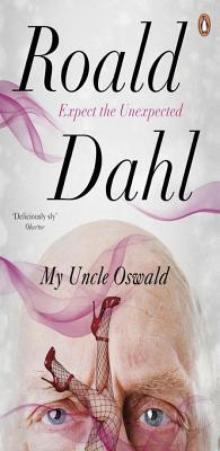 My Uncle Oswald
My Uncle Oswald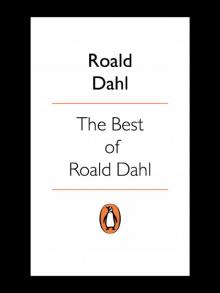 The Best of Roald Dahl
The Best of Roald Dahl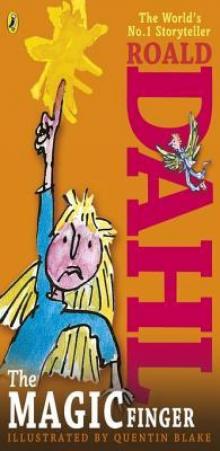 The Magic Finger
The Magic Finger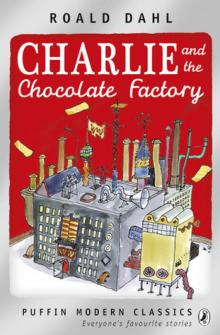 Charlie and the Chocolate Factory
Charlie and the Chocolate Factory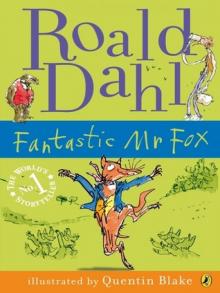 Fantastic Mr Fox
Fantastic Mr Fox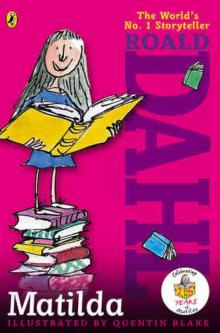 Matilda
Matilda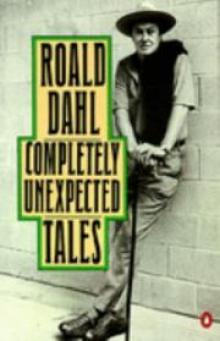 Completely Unexpected Tales: Tales of the Unexpected. More Tales of the Unexpected
Completely Unexpected Tales: Tales of the Unexpected. More Tales of the Unexpected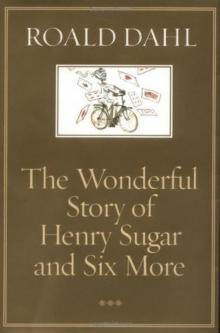 The Wonderful Story of Henry Sugar and Six More
The Wonderful Story of Henry Sugar and Six More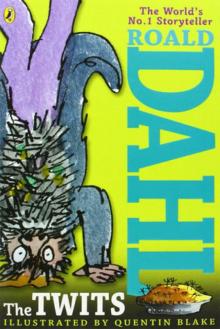 The Twits
The Twits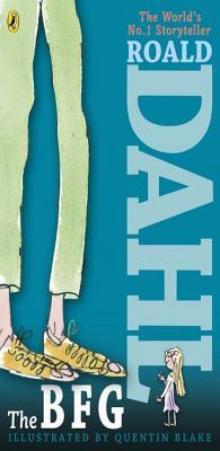 The BFG
The BFG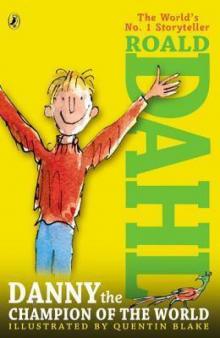 Danny the Champion of the World
Danny the Champion of the World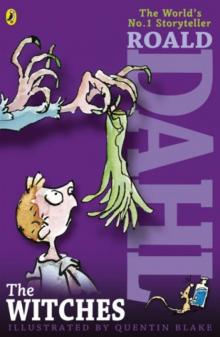 The Witches
The Witches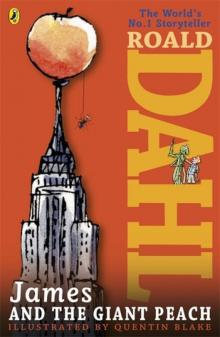 James and the Giant Peach
James and the Giant Peach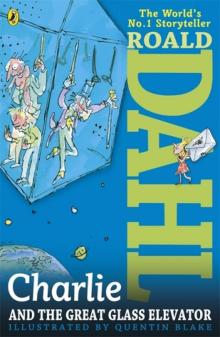 Charlie and the Great Glass Elevator
Charlie and the Great Glass Elevator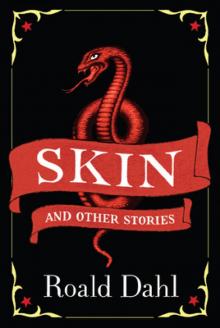 Skin and Other Stories
Skin and Other Stories Kiss Kiss
Kiss Kiss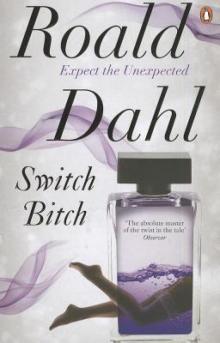 Switch Bitch
Switch Bitch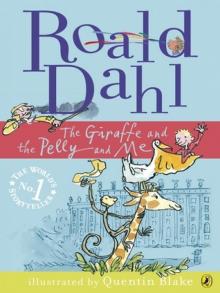 The Giraffe and the Pelly and Me
The Giraffe and the Pelly and Me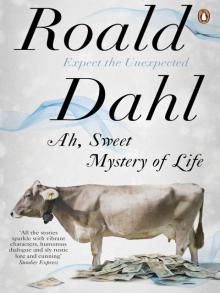 Ah, Sweet Mystery of Life
Ah, Sweet Mystery of Life Fear
Fear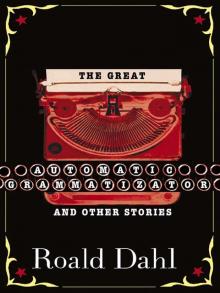 The Great Automatic Grammatizator and Other Stories
The Great Automatic Grammatizator and Other Stories Someone Like You
Someone Like You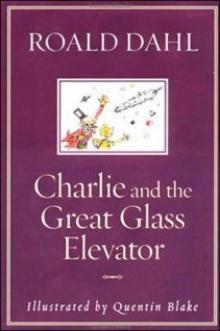 Charlie and the Great Glass Elevator c-2
Charlie and the Great Glass Elevator c-2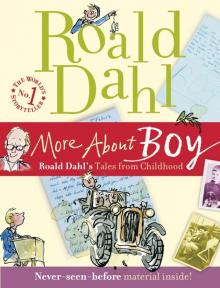 More About Boy
More About Boy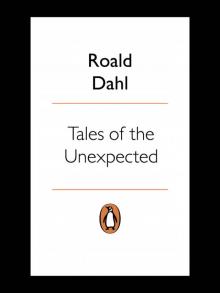 Tales of the Unexpected
Tales of the Unexpected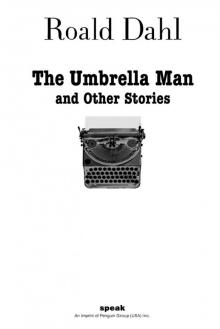 The Umbrella Man and Other Stories
The Umbrella Man and Other Stories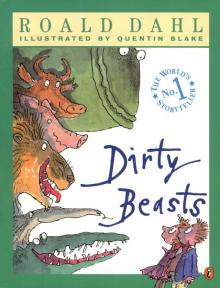 Dirty Beasts
Dirty Beasts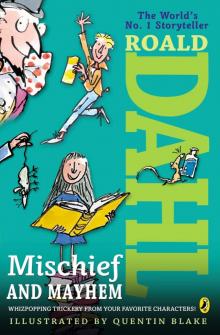 Roald Dahl's Mischief and Mayhem
Roald Dahl's Mischief and Mayhem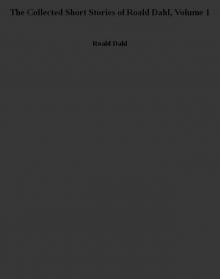 The Collected Short Stories of Roald Dahl, Volume 1
The Collected Short Stories of Roald Dahl, Volume 1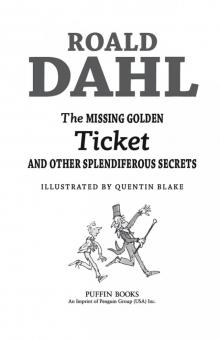 The Missing Golden Ticket and Other Splendiferous Secrets
The Missing Golden Ticket and Other Splendiferous Secrets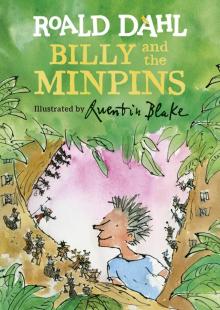 Billy and the Minpins
Billy and the Minpins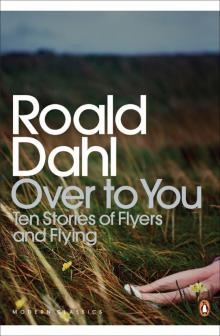 Over to You
Over to You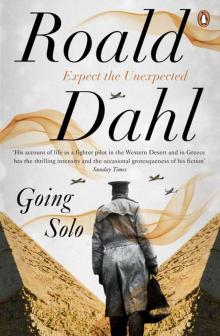 Going Solo
Going Solo Deception
Deception War
War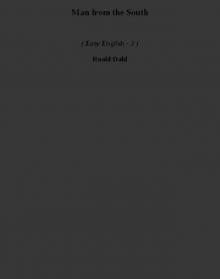 Man from the South ee-3
Man from the South ee-3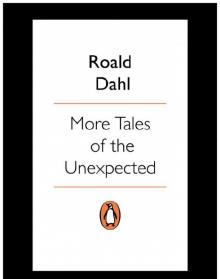 More Tales of the Unexpected
More Tales of the Unexpected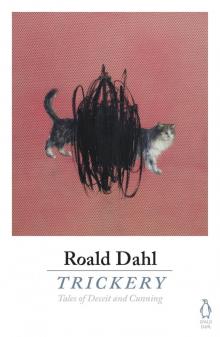 Trickery
Trickery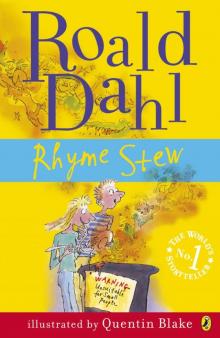 Rhyme Stew
Rhyme Stew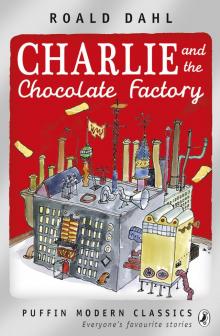 Charlie and the Chocolate Factory (Puffin Modern Classics relaunch)
Charlie and the Chocolate Factory (Puffin Modern Classics relaunch)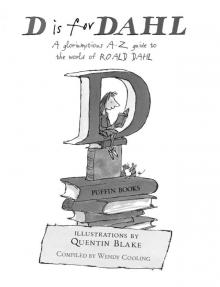 D is for Dahl
D is for Dahl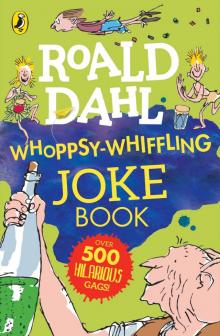 Roald Dahl Whoppsy-Whiffling Joke Book
Roald Dahl Whoppsy-Whiffling Joke Book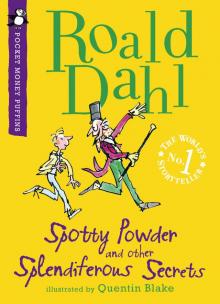 Spotty Powder and other Splendiferous Secrets
Spotty Powder and other Splendiferous Secrets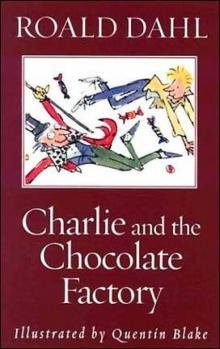 Charlie and the Chocolate Factory c-1
Charlie and the Chocolate Factory c-1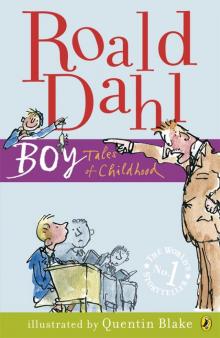 Boy
Boy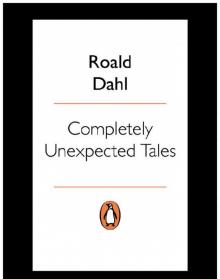 Completely Unexpected Tales
Completely Unexpected Tales Madness
Madness Innocence
Innocence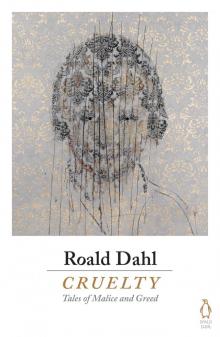 Cruelty
Cruelty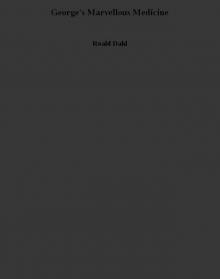 George's Marvellous Medicine
George's Marvellous Medicine